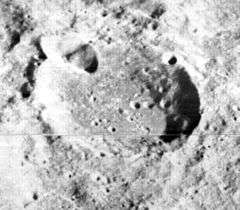Seidel (crater)
| Coordinates | 32°48′S 152°12′E / 32.8°S 152.2°ECoordinates: 32°48′S 152°12′E / 32.8°S 152.2°E |
|---|---|
| Diameter | 62 km |
| Depth | Unknown |
| Colongitude | 202° at sunrise |
| Eponym | Philipp L. von Seidel |

Oblique Lunar Orbiter 2 view, facing south
Seidel is a worn lunar impact crater that lies to the east-northeast of the much larger crater Jules Verne. Farther to the east of Seidel is the western edge of Mare Ingenii, and to the northeast lies the crater O'Day.
This is an eroded crater with a small crater overlying the south-southeastern outer rim. The southern rim is overlain by material deposits, most likely ejecta from another impact. The remainder of the rim has survived fairly well, and is marked only by tiny craterlets and general wear. The interior floor is relatively level with a few tiny craterlets marking the surface.
Satellite craters
By convention these features are identified on lunar maps by placing the letter on the side of the crater midpoint that is closest to Seidel.
| Seidel | Latitude | Longitude | Diameter |
|---|---|---|---|
| J | 33.5° S | 152.8° E | 19 km |
| M | 35.3° S | 152.0° E | 28 km |
| U | 32.5° S | 150.2° E | 33 km |
References
- Andersson, L. E.; Whitaker, E. A. (1982). NASA Catalogue of Lunar Nomenclature. NASA RP-1097.
- Blue, Jennifer (July 25, 2007). "Gazetteer of Planetary Nomenclature". USGS. Retrieved 2007-08-05.
- Bussey, B.; Spudis, P. (2004). The Clementine Atlas of the Moon. New York: Cambridge University Press. ISBN 978-0-521-81528-4.
- Cocks, Elijah E.; Cocks, Josiah C. (1995). Who's Who on the Moon: A Biographical Dictionary of Lunar Nomenclature. Tudor Publishers. ISBN 978-0-936389-27-1.
- McDowell, Jonathan (July 15, 2007). "Lunar Nomenclature". Jonathan's Space Report. Retrieved 2007-10-24.
- Menzel, D. H.; Minnaert, M.; Levin, B.; Dollfus, A.; Bell, B. (1971). "Report on Lunar Nomenclature by the Working Group of Commission 17 of the IAU". Space Science Reviews. 12 (2): 136–186. Bibcode:1971SSRv...12..136M. doi:10.1007/BF00171763.
- Moore, Patrick (2001). On the Moon. Sterling Publishing Co. ISBN 978-0-304-35469-6.
- Price, Fred W. (1988). The Moon Observer's Handbook. Cambridge University Press. ISBN 978-0-521-33500-3.
- Rükl, Antonín (1990). Atlas of the Moon. Kalmbach Books. ISBN 978-0-913135-17-4.
- Webb, Rev. T. W. (1962). Celestial Objects for Common Telescopes (6th revised ed.). Dover. ISBN 978-0-486-20917-3.
- Whitaker, Ewen A. (1999). Mapping and Naming the Moon. Cambridge University Press. ISBN 978-0-521-62248-6.
- Wlasuk, Peter T. (2000). Observing the Moon. Springer. ISBN 978-1-85233-193-1.
This article is issued from
Wikipedia.
The text is licensed under Creative Commons - Attribution - Sharealike.
Additional terms may apply for the media files.